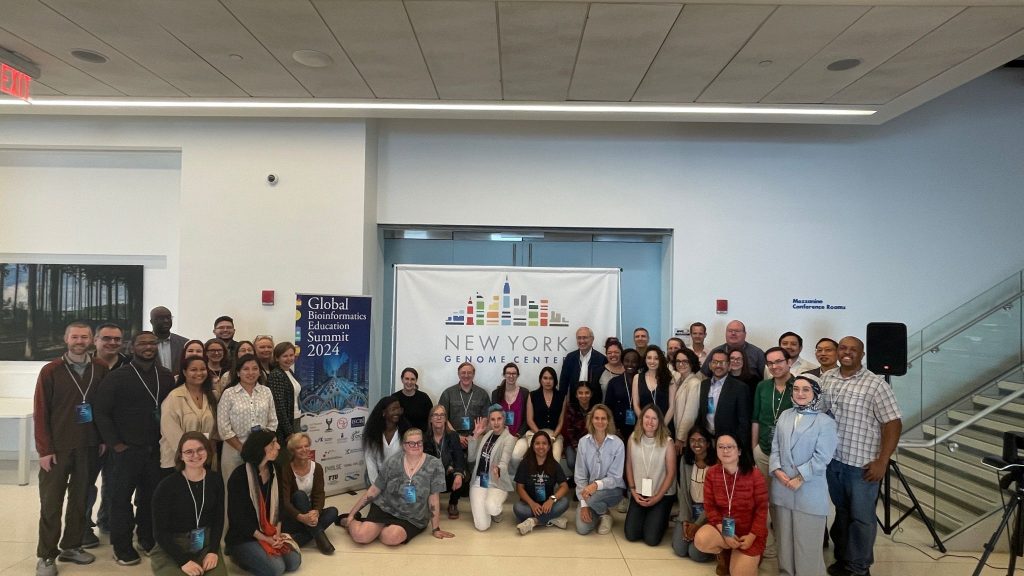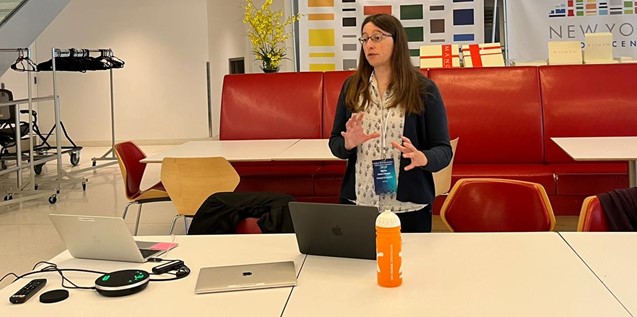Discussing challenges and strategies in bioinformatics education at the Global Bioinformatics Education Summit
In May 2024, several members of the EMBL-EBI Training Team were delighted to be able to attend the 6th edition of the Global Bioinformatics Education Summit. This working meeting gathers bioinformatics educators and other experts to address challenges in bioinformatics education and workforce development. Around 70 participants met in person at the New York Genome Center in Manhattan, and more than 100 people joined online from all over the world.

The EMBL-EBI Training Team coordinates a broad portfolio of training activities in bioinformatics and our training is aimed at a global audience. Therefore, the Global Bioinformatics Education Summit provides an excellent opportunity to exchange experiences and views with other professionals in bioinformatics education. We can ensure that our programme is kept up to date, that our practices are aligned with the field and that we are addressing main global challenges in bioinformatics.
The event covered a broad range of topics relevant to bioinformatics education. This included conversations on specific practices for the delivery of training events, such as how to make your training materials FAIR or how to assess learning. We also discussed global challenges and strategy, such as the grand challenges in bioinformatics and how to make training more accessible, for example use of closed captions and using free virtual platforms for computer resources.
Leading the discussion
As well as attending, the EMBL-EBI Training Team are part of the organising committee, and we coordinate and facilitate some of some of the sessions. This year, three members of the Training team co-led sessions during the event:
- Anna Swan – “How to: green training”. Participants discussed both the wider environmental impact of training, and how to encourage greener practices for delivery of programs and in our learners’ ongoing work. Examples of greener practices include limiting sizes of datasets used during training, reducing the need for travel and encouraging the use of reproducible workflows.
- Patricia Carvajal-López – “Training in low and middle income countries”. This was the conclusion of recent efforts to address challenges that are especially relevant in these countries. A set of initiatives and resources from this work will be shared with training communities.
- Marta Lloret – “How to use competencies”. This short workshop demonstrated how to use a competency framework to design training programmes.
- Marta and Patricia – “The competency framework for core facility scientists”. This session presented the work we’ve done so far and was a chance for the community to input into the framework.
Other members of the EMBL-EBI Training Team were involved in the development and discussion of many other topics, including Train-the-trainer courses for bioinformatics and the FAIR checklist for training materials.

Looking to the future
We all left the summit full of new ideas on how to improve our training and our reach. Particularly interesting thoughts include how generative AI can be used to support development of interactive training content and what measures we could use to improve global accessibility to training and materials.
One of the outcomes of the summit was agreeing on a set of priorities that we need to continue working on. By following these priorities, we will ensure the continuous improvement of our training activities and of Bioinformatics Education globally.